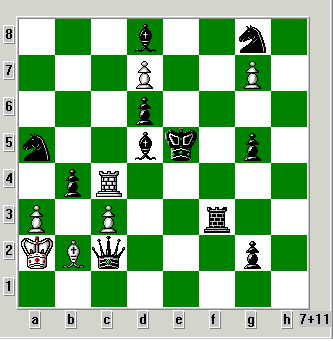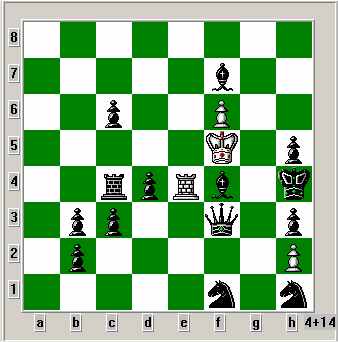Lubomir URSTA
| Sapomat (Se-he-mate)
Lubomir URSTA |
Visitor No. |
Se-he-mate is a selfmate and a helpmate in one problem (sapomat is an analogy in the Czech language). The position is the same in both problems, only the colour of all pieces must be changed. Thus, the same king is mated in both problems, only the pawns change their directions.
Absolutely different constructions of self- and helpmates complicate possibilities how to bring contents into a sapomat.
In spite of that the content was successfully brought in several problems: it is a formal theme, when solutions of self- and helpmates have the same order of moving pieces (a kind of analogy can be observed in the Balbo theme where values of pieces correspond). The author suggests to call it 'Ohrada theme' according to the place of origin. If the helpmate has more solutions, all of them must comply with the condition. If a pawn is promoted into any piece, possible following moves of this piece are considered (for this theme purposes) moves of the original pawn. In case solutions of self- and helpmates have different number of moves, moving pieces must correspond in the number of moves of a shorter problem.
The following examples (with the same number of moves in self- and helpmates)
are probably the best way to clarify the situation:
they are two two-movers. Diagrams contain helpmate positions,
before solving selfmates colours of all pieces must be inverted.
In the solutions you can see that in all half-moves of self- and helpmates
the same pieces move.
| Lubomir URSTA | Lubomir URSTA | ||||||||
| original | original | ||||||||
 |
 |
||||||||
|
|
| H2#: 1.Rf8 gxf8B 2.Qf5 cxb4# | H2#: 1.Qd1 Kxf4 2.Qa1 Kf5# | |
| S2#: 1.Rf1 g6 2.Qe2 c2# | S2#: 1.Qd3 Kxf4 2.Qf3 Kxf3# |
This all is rather a kind of interest and recession, but it is still
more or less an orthodox problem and the composer does not have to change
the way of composing. Therefore, I'm opening a composition competition
in the above theme in sapomat. There are no other conditions for the problems,
fairy-pieces and fairy-conditions are allowed, self- and helpmates may differ
as for the number of moves.
The chief arbiter is Michal Dragoun, whom I'd like to thank a lot for
all the previous and following help and support including a review and
a translation of this article. The winners will definitely enjoy small
prizes. Please send problems to: Lubomir Ursta, Drimlova 2513, 155 00,
Praha 5, Czech Republic, or to: lubos.ursta@oracle.com,
information about
the competition can be found also on
http://www.ursta.com/chess/problems/sapomat/intro_en.htm
or simply www.ursta.com . The deadline is November 30th, 2003.
The competition results
| Add a Message or a Chess Problem | |
| Back to Lubomir URSTA's homepage |